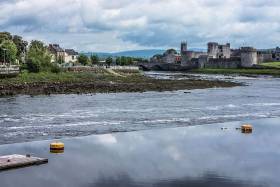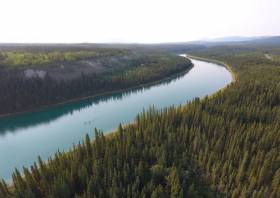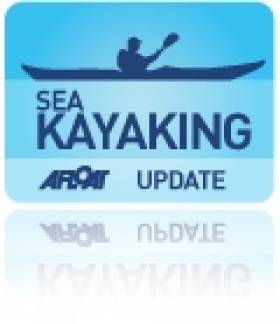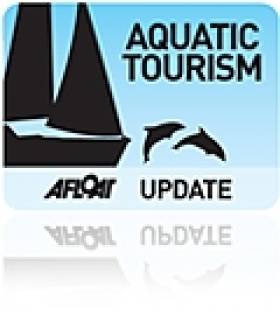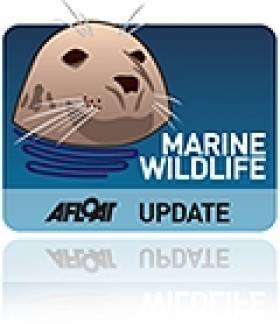Displaying items by tag: Jim Kennedy
Yukon Challenge Kayakers To Recreate ‘Paddle For Peace’ From Enniskillen To Limerick
An experienced kayaker in training for the world’s longest non-stop paddle race also aims to recreate the ‘paddle for peace’ that celebrated the signing of the Good Friday Agreement.
In 1999, Jim Kennedy and friends showed their support for the historic peace treaty by kayaking from Enniskillen to Limerick along the then reunited Shannon and Erne systems.
“We formed a team of like-minded people from both sides of the border to achieve this,” Kennedy says. “From Enniskillen we had Noel Maguire and from the south we had Pat McCarthy, with Maria Kennedy and Vicky Platt at a bank support team.
“On the way we called on schools and they supported us by doing peace projects in the class room and cheering us on as we passed.”
Kennedy recalls the many villages and towns that hosted the paddling party as they progressed: “We were given a plaque and message of peace by Fermanagh council to deliver to the Limerick County Council. We planted trees of peace in many villages along the way.”
Sections that would have been otherwise impassable were cleared for paddling thanks to the aid of Civil Defence, who opened canal locks, and the ESB, who allowed passage through the Ardnacrusha hydroelectric plant.
Years before the age of social media, the journey, as Kennedy says, “evolved into a great show of support for peace from both ends of the waterways and from all walks of life”.
Twenty years on, there is a generation that has never known the violence of the Troubles first-hand. However, Kennedy says, “we again find ourselves frustrated at all the goings on in the world and are hoping in our small way to draw attention to and celebrate 20 years of peace in Ireland”.
Once more, Kennedy plans to kayak the more than 200 miles from Enniskillen to Limerick, carrying another plaque of peace from council to council.
Noel Maguire and Pat McCarthy have also signed on for the repeat adventure — as has Colin Wong, with whom Kennedy will be taking on the Yukon 1000 challenge in Canada and Alaska next summer, as previously reported on Afloat.ie.
“We hope that many other paddlers from north and south will join in along the way,” Kennedy says. “Should you be interested in joining in or finding out more about this celebration paddle, just let us know or give us a peaceful shout out as we pass by!”
Get in touch with Jim Kennedy via the Facebook page for Atlantic Sea Kayaking.
‘More People Have Summited Everest’: Experienced Irish Duo To Take On World’s Longest Non-Stop Paddle Race
Former kayaking champion Jim Kennedy is embarking on a new adventure — as part of a two-man team taking on the world’s longest non-stop paddle race.
Kennedy has partnered with fellow Irish champion kayaker Colin Wong to represent Ireland in next year’s Yukon 1000 — which as the name suggests is a 1,000-mile river marathon, from Whitehorse in Canada’s Yukon territory to the Yukon River Bridge in central Alaska.
The pair are among only 40 teams chosen out hundreds who apply for the biennial race, which must be completed within 10 days from Sunday 19 July 2020.
But they feel they have the skills and experience between them to reach the finish line within their target of eight days without rest — comprising around one million paddle strokes from end to end through some of the world’s most isolated wilderness.
“More people have summited Everest than have navigated this stretch of river,” Kennedy says.
The 65-year-old and proprietor of Atlantic Sea Kayaking is a long-time instructor and paddling guide, with British and Irish sprint and marathon kayaking titles to his credit — and who has twice competed in and won the 200km non-stop Devizes to Westminster International Canoe Marathon.
Kennedy is also known for paddling the length of Ireland with a cross-border group in support of peace upon the signing of the Good Friday Agreement.
His paddling partner Wong (35) operates his own guided kayaking company in the West of Ireland, and brings a wealth of experience paddling in Africa — from helping to open up rivers in South Africa, Zimbabwe and Kenya, to guiding white water expeditions on the White Nile in Uganda, and being one of the few to run the Zambezi during the rainy season.
Along with long-distance river adventures in the Middle East and central Asia, as well as kayaking marathons and races closer to home such as the Liffey Descent, Wong also has experience of Alaska’s rivers which will no doubt come to bear.
Kennedy says he and Wong have “many reasons for wanting to compete in this incredible race”, not least promoting wellbeing and celebrating “the mental and physical benefits of exercise and nature”.
“Living along the Wild Atlantic Way in Ireland has taught us the importance of responsible adventure and activity,” he adds, emphasising that their adventure aims to highlight growth in adventure tourism in a responsible and sustainable manner.
Lough Hyne Kayaking Features On TV Down Under
#Kayaking - Jim Kennedy is already reknowned in these islands as a former kayaking champion and long-time paddling guide – but now he's a TV star in Australia to boot.
As the Southern Star reports, the founder of Atlantic Sea Kayaking recently welcomed Trevor Cochrane, host of the Nine Network's ExploreTV, with a tour of the placid waters of Lough Hyne in West Cork.
Cochrane also visits nearby Baltimore, relating some of its storied maritime history, while singing the praises of the Irish coast's rugged beauty.
Cork The Place to Be For a Holiday On The Sea
#TOURISM - Winter might be upon us, but it's a great time to plan a new year holiday in Ireland on the sea, according to the UK's Daily Echo.
From night-time paddling in with renowned kayaking instructor Jim Kennedy, to snorkelling in Baltimore, relaxing in Skibbereen and and fresh seafood lunches in Kinsale, a vacation in Cork can appeal to any taste.
Whale and dolphin watching is a big draw for the region, too, as Ireland's coast – the first cetacean sanctuary in Europe - plays host to a growing variety of species.
The summer feeding grounds off the southern coast are particularly busy, and tourist boats are often treated to whales breaching the surface and surrounded by dolphins putting on a show.
The Daily Echo has more on the story HERE.
First Sighting of a Dolphin in an Irish Lake
#MARINE WILDLIFE - The first recorded sighting of a dolphin in an Irish lake has been reported by the Irish Whale and Dolphin Group (IWDG), according to The Irish Times.
The dolphin was spotted in Lough Hyne, a saltwater lake near Baltimore in Co Cork by Skibbereen-based kayaking instructor Jim Kennedy, who filmed it over a number of days.
"To the best of my knowledge, and I’m open to correction, this is the first validated record of a cetacean using an Irish lake," said the IWDG's Pádraig Whooley.
Though there have been no further sightings since then, there is nothing to indicate that the dolphin has yet left the lough for the open sea.
As previously reported on Afloat.ie, Lough Hyne was also recently visited by a 13-metre fin whale that was sadly found beached in stormy conditions on the Sligo coast this week.
The Irish Times has more on the story HERE.



























